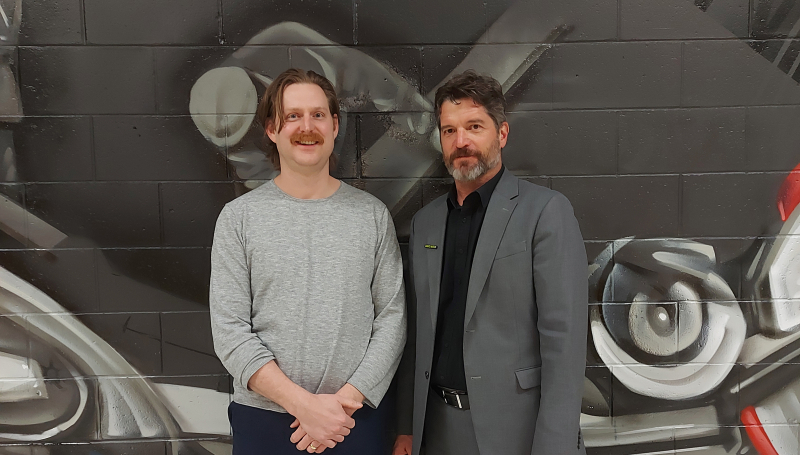Program Overview
Mechanical Engineering is the study of the principles of physics for the purpose of harnessing energy for human consumption. This program provides students with the knowledge to conduct the analysis, design, manufacturing, and maintenance of mechanical systems. Students will develop a solid understanding of core concepts including mechanics, kinematics, thermodynamics, fluid mechanics, and energy and their applications to automotive processes. Mechanical Engineering Technologists use the core principles as well as specialized knowledge in the field to design and analyze motor vehicles, aircraft, heating and cooling systems, watercraft, manufacturing plants, industrial machinery, and automation.
Program Highlights
- State-of-the-art training facility in the on-site Ford Centre for Excellence in Manufacturing.
- Credit Transfer Program with the University of Windsor Faculty of Engineering and additional universities.
- Opportunity for students to attend field trips to local design and manufacturing facilities along with events/conferences focused on progression in the mobility sector.
- Students in this program fare exceptionally well at Provincial and National Skills Competitions in Mechanical CAD.
- Automotive-focused course labs delivered with hands-on training in the Automotive building at St. Clair College.
Career Opportunities
Graduates find excellent opportunities in product development, testing and analysis, computer-aided design and drafting, material selection and estimating machine and system component design, technical sales and junior management positions in the energy, manufacturing, controls and alternative energy industries.
Degree Completions
Please contact the University of Windsor or your Program Chair for transfer credit program details and completion plan.
Graduates of this program can finish their Bachelor of Engineering degree through the Lakehead University - College Engineering Technology transfer program or transfer to Wayne State into the Honors Bachelor of Science in General Engineering - Mechanical Engineering concentration.
Cooperative Education
Cooperative education (co-op) provides students with an opportunity to apply their academic knowledge in the workplace, gain real-world experience and build their professional network by integrating co-op work terms between academic semesters. Students in the co-op option will have the opportunity to complete two co-op work terms.
Students in the Mechanical Engineering Technology – Automotive Product Design program will have the opportunity to apply for the co-op option during the first semester of the program. Spaces for the co-op option are limited and securing a paid co-op position is highly competitive. Students accepted into the co-op option will be required to attend co-op workshops, meet with their co-op coordinator, and actively search and compete for a co-op position. Additional fees apply to cover these services. Payment of these fees does not guarantee a co-op position.
The co-op program has been operating for several years with great success with positive feedback from both employers and participating students.
Admission Requirements
OSSD with the majority of courses at the College (C), University (U), University/College (M) or Open (O) level plus:
- Grade 12 Math (C) or (U)
- Senior Level Physics (C) or (U)
Mature students - See Admission Procedures for details.
Courses
Please scroll to the bottom of the list to review the Pre/Co-Requisites.
The curriculum below is for incoming students:
Spring
| Code | Title | Credits |
|---|---|---|
|
MET1500
|
Co-Op Work Term I |
28
|
Semester 4 - Winter
| Code | Title | Credits |
|---|
Spring
| Code | Title | Credits |
|---|---|---|
|
MET2500
|
Co-Op Work Term II |
28
|
Semester
| Code | Title | Credits |
|---|---|---|
|
MET3500
|
Co-Op Work Term III |
28
|
Note: Class semesters will take place in the season noted.
Students who plan to pursue a University Degree in Engineering would benefit by taking the following optional math courses when offered:
- MTH505 - Linear Algebra - Credits 4
- MTH605 - Calculus B - Credits 4
- MTH805 - Differential Equations - Credit 4
- MTH705 - Vector Calculus - Credits 4
View Pre/Co-Requisites for Mechanical Engineering Technology - Automotive Product Design
Placement Requirements
For a student to be eligible for co-op position consideration, the following must be met:
- Co-op positions are highly competitive therefore students must meet minimum academic requirements to apply for co-op positions.
- Students must be in good academic standing and must successfully complete all courses in the previous semesters and have a GPA of at least 2.5 or better.
- Specific trade and safety training and/or other requirements of the employer, which may also include police clearance, proof of immunization, etc.
Program Physical Demands Analysis
Program Vocational Learning Outcomes
Mechanical Engineering Technology (Ontario College Advanced Diploma) (MTCU Code 61007)
The graduate has reliably demonstrated the ability to:
- Monitor compliance with current legislation, standards, regulations and guidelines.
- Plan, coordinate, implement and evaluate quality control and quality assurance procedures to meet organizational standards and requirements.
- Monitor and encourage compliance with current health and safety legislation, as well as organizational practices and procedures.
- Develop and apply sustainability best practices in workplaces.
- Use current and emerging technologies to implement mechanical engineering projects.
- Analyze and solve complex mechanical problems by applying mathematics and fundamentals of mechanical engineering
- Prepare, analyze, evaluate and modify mechanical engineering drawings and other related technical documents.
- Design and analyze mechanical components, processes and systems by applying fundamentals of mechanical engineering.
- Design, manufacture and maintain mechanical components according to required specifications.
- Establish and verify the specifications of materials, processes and operations for the design and production of mechanical components.
- Plan, implement and evaluate projects by applying project management principles.
- Develop strategies for ongoing personal and professional development to enhance work performance.
- Apply business principles to design and engineering practices.
SCC enriched vocational learning outcomes
- Design, analyze, and validate automotive systems and components—including engines, drivetrains, brakes, suspension, and steering—by applying mechanical engineering principles, vehicle dynamics, and industry standards to meet performance, safety, and regulatory requirements.
- Develop and integrate automotive product design solutions using 3D modeling software to support the designing, prototyping, and testing of vehicle systems and components in alignment with industry standards





